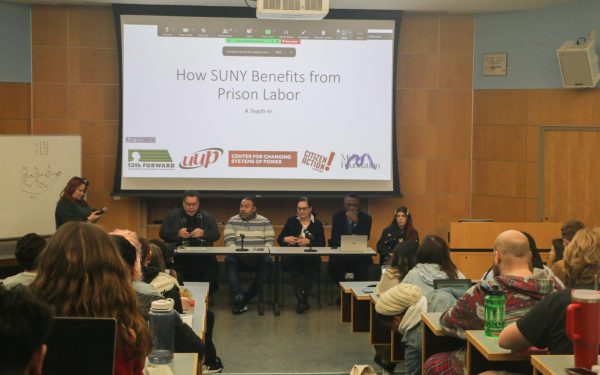
Students gathered in front of Stony Brook University’s Humanities building on March 25, 2024 to hear from professors and advocates about the University’s tumultuous history with Corcraft — a New York State entity that manufactures and sells products made by incarcerated people.
“In 2017, they [Corcraft] made $53 million dollars in revenue. This was no small amount,” Stony Brook Assistant Professor Robert Chase said. “But then, to remind you, New York State prisoners earn a starting wage of 16 cents an hour. This can be increased to a maximum of 65 cents an hour.”
SUNY schools have spent around $2.9 million dollars on Corcraft products, and Stony Brook University is listed as one of the system’s top three spenders. The University spends around $40,000 dollars on products from Corcraft per year.
Non-incarcerated New Yorkers working minimum wage can earn at least $15 dollars an hour as of 2024 — over 93 times more than an incarcerated person. Chase explains that prisoners who work to build items such as bookcases, file cabinets and hand sanitizers must do so under potentially hazardous conditions.
Prisoners who made hand sanitizer during the COVID-19 pandemic did so in open-air environments, often without face masks or social distancing. Despite being involved with the production process, inmates were not allowed to use hand sanitizer because it contained alcohol.
The panel speakers pointed out how the conditions that incarcerated people in New York must work under in order to earn meager wages mimic slavery.
Moderating the panel was Stacy Finkelstein, a Stony Brook professor and area head of marketing on campus.
Speakers of the panel from Stony Brook University faculty included Chase and Professor of Africana Studies Patrice Nganang. Community organizer Wilfredo Laracuente and Executive Director of Citizen Action of New York Rosemary Rivera also attended as panelists.
When discussing how state prisons are able to get away with these working conditions, Chase brought up how the 13th Amendment plays a key role.
“And what are the legal structures that fashion prison labor as unpaid enslavement?” Chase asked. “One is the most ironic of them all, which is the 13th Amendment, which states of course, that slavery is illegal, except when someone commits a crime. That infamous clause highlighted there in bold, which allows enslavement or work for the state to continue.”
The panel was co-sponsored with the organization 13th Forward, whose goal is to “end exploitation and brutality within our prison labor system.” Laracuente explained that one of the proposed bills is to take out the clause that excludes incarcerated people from being protected from unpaid and underpaid labor, thus forcing these institutions to pay fair wages.
Rivera, who was incarcerated for eight years, spoke about how there are two foundational principles that encompass slavery. The first being that an enslaved person is considered to be property and no longer human. She recalled a time where she played handball in the prison yard and got sunburned, after which she was written up for “destroying state property.”
The second principle she discussed is that slavery is tied to capitalism and corporate greed. Rivera noted that she was paid a wage of 12 cents an hour for years doing heavy industrial labor.
As Stony Brook University and other SUNY schools continue to buy from Corcraft, Nganang suggested ways that the University should hold itself accountable.
“From my point of view as a writer, I think that the first thing is, first of all, for Stony Brook to acknowledge that they actually have been committing a crime all along — by using slave labor,” Nganang said.
He also explained that after an acknowledgment, the University should apologize to the people who have been wronged. He stated, “It is a matter of dignity.”
Nganang’s final suggestion was enforcing reparations. He said that payment is one part, but the other part is offering fellowships and scholarships for Black students who are disproportionately incarcerated compared to the white population. In addition, Nganang believes that the University should provide opportunities for prisoners to get a college education.
The panel discussion closed with Stony Brook student and The Statesman’s Opinions Editor Sara McGiff suggesting ways in which students can help hold the University accountable. She pointed out that anyone can submit a FOIA request, which asks for records from a federal agency. This can be done to ensure that the University is holding itself to the standards it set back in 2020, when officials vowed to address major societal problems as a public institution.











isabella ortiz • Apr 21, 2024 at 7:09 pm
Wow, Aloki Pandya, this is a beautifully written article. Your work is amazing!
Gabby Guevara • Apr 18, 2024 at 4:02 pm
I’ve been Aloki Pandya’s fan from Day 1!! I’m looking forward to all her future works!!!
Alia Sapra • Apr 17, 2024 at 3:03 pm
Aloki Pandya, I am your biggest fan. Everything you write in the statesman catches my eye. You are one of a kind. I like the way you think!
Alia Sapra • Apr 17, 2024 at 2:55 pm
Wow best article I’ve ever read. The best the statesman’s ever had! We learn something new everyday.